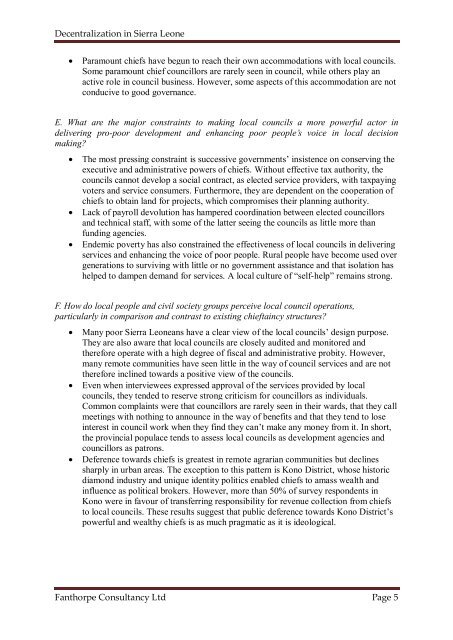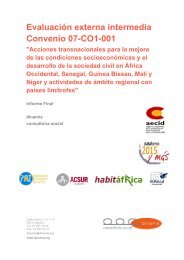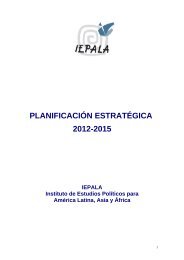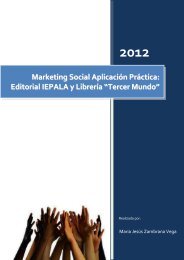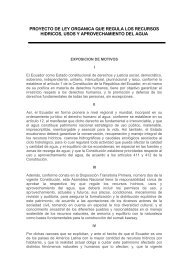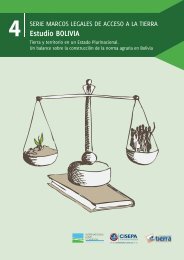Decentralization in Sierra Leone - Research for Development
Decentralization in Sierra Leone - Research for Development
Decentralization in Sierra Leone - Research for Development
You also want an ePaper? Increase the reach of your titles
YUMPU automatically turns print PDFs into web optimized ePapers that Google loves.
<strong>Decentralization</strong> <strong>in</strong> <strong>Sierra</strong> <strong>Leone</strong>Paramount chiefs have begun to reach their own accommodations with local councils.Some paramount chief councillors are rarely seen <strong>in</strong> council, while others play anactive role <strong>in</strong> council bus<strong>in</strong>ess. However, some aspects of this accommodation are notconducive to good governance.E. What are the major constra<strong>in</strong>ts to mak<strong>in</strong>g local councils a more powerful actor <strong>in</strong>deliver<strong>in</strong>g pro-poor development and enhanc<strong>in</strong>g poor people’s voice <strong>in</strong> local decisionmak<strong>in</strong>g?The most press<strong>in</strong>g constra<strong>in</strong>t is successive governments’ <strong>in</strong>sistence on conserv<strong>in</strong>g theexecutive and adm<strong>in</strong>istrative powers of chiefs. Without effective tax authority, thecouncils cannot develop a social contract, as elected service providers, with taxpay<strong>in</strong>gvoters and service consumers. Furthermore, they are dependent on the cooperation ofchiefs to obta<strong>in</strong> land <strong>for</strong> projects, which compromises their plann<strong>in</strong>g authority.Lack of payroll devolution has hampered coord<strong>in</strong>ation between elected councillorsand technical staff, with some of the latter see<strong>in</strong>g the councils as little more thanfund<strong>in</strong>g agencies.Endemic poverty has also constra<strong>in</strong>ed the effectiveness of local councils <strong>in</strong> deliver<strong>in</strong>gservices and enhanc<strong>in</strong>g the voice of poor people. Rural people have become used overgenerations to surviv<strong>in</strong>g with little or no government assistance and that isolation hashelped to dampen demand <strong>for</strong> services. A local culture of “self-help” rema<strong>in</strong>s strong.F. How do local people and civil society groups perceive local council operations,particularly <strong>in</strong> comparison and contrast to exist<strong>in</strong>g chiefta<strong>in</strong>cy structures?Many poor <strong>Sierra</strong> <strong>Leone</strong>ans have a clear view of the local councils’ design purpose.They are also aware that local councils are closely audited and monitored andthere<strong>for</strong>e operate with a high degree of fiscal and adm<strong>in</strong>istrative probity. However,many remote communities have seen little <strong>in</strong> the way of council services and are notthere<strong>for</strong>e <strong>in</strong>cl<strong>in</strong>ed towards a positive view of the councils.Even when <strong>in</strong>terviewees expressed approval of the services provided by localcouncils, they tended to reserve strong criticism <strong>for</strong> councillors as <strong>in</strong>dividuals.Common compla<strong>in</strong>ts were that councillors are rarely seen <strong>in</strong> their wards, that they callmeet<strong>in</strong>gs with noth<strong>in</strong>g to announce <strong>in</strong> the way of benefits and that they tend to lose<strong>in</strong>terest <strong>in</strong> council work when they f<strong>in</strong>d they can’t make any money from it. In short,the prov<strong>in</strong>cial populace tends to assess local councils as development agencies andcouncillors as patrons.Deference towards chiefs is greatest <strong>in</strong> remote agrarian communities but decl<strong>in</strong>essharply <strong>in</strong> urban areas. The exception to this pattern is Kono District, whose historicdiamond <strong>in</strong>dustry and unique identity politics enabled chiefs to amass wealth and<strong>in</strong>fluence as political brokers. However, more than 50% of survey respondents <strong>in</strong>Kono were <strong>in</strong> favour of transferr<strong>in</strong>g responsibility <strong>for</strong> revenue collection from chiefsto local councils. These results suggest that public deference towards Kono District’spowerful and wealthy chiefs is as much pragmatic as it is ideological.Fanthorpe Consultancy Ltd Page 5


